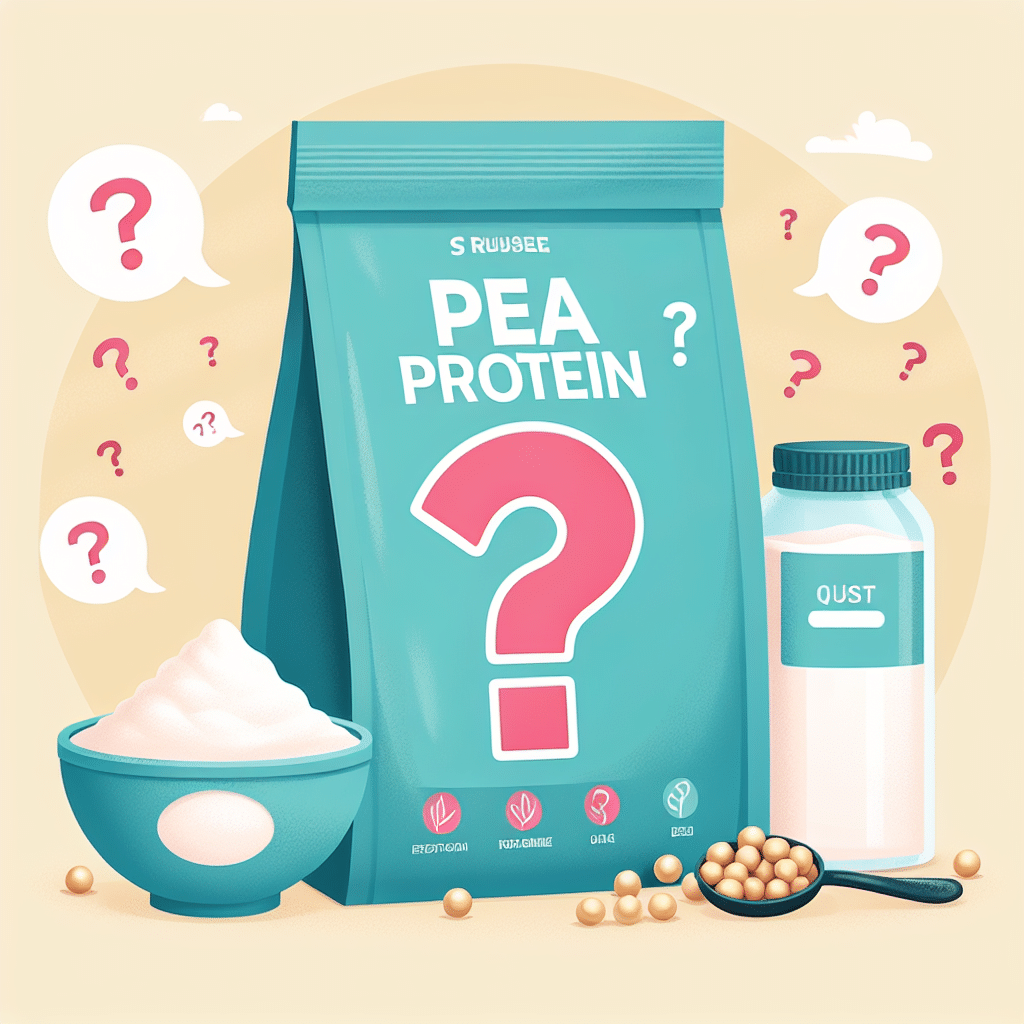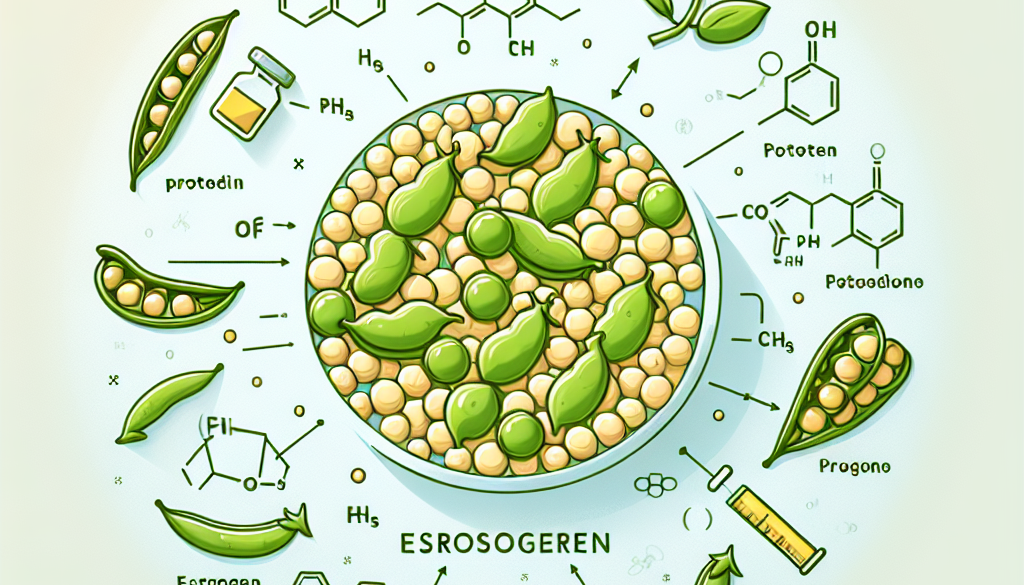Is Pea Protein Full Of Estrogen?
-
Table of Contents
- Pea Protein and Estrogen Levels: Unveiling the Truth
- Understanding Estrogen and Phytoestrogens
- Pea Protein: Composition and Nutritional Profile
- Is Pea Protein Full of Estrogen?
- Health Benefits of Pea Protein
- Comparing Pea Protein to Other Protein Sources
- Case Studies and Research
- Conclusion: Pea Protein as a Safe and Nutritious Choice
- Discover ETprotein’s Premium Pea Protein Products
Pea Protein and Estrogen Levels: Unveiling the Truth

With the rise of plant-based diets and the increasing demand for non-animal protein sources, pea protein has emerged as a popular alternative to traditional whey protein. However, as with any dietary trend, questions and concerns arise about its nutritional content and health implications. One such concern is whether pea protein is full of estrogen, a hormone that plays a crucial role in both female and male bodies. This article delves into the science behind pea protein and its estrogen content, providing a comprehensive analysis for health-conscious consumers.
Understanding Estrogen and Phytoestrogens
Before we examine pea protein specifically, it’s essential to understand what estrogen is and how it functions in the body. Estrogen is a steroid hormone responsible for the development and regulation of the female reproductive system and secondary sexual characteristics. While it is predominantly a female hormone, men also produce estrogen in smaller amounts, where it’s necessary for bone health and other functions.
Phytoestrogens, on the other hand, are plant-derived xenoestrogens not generated within the endocrine system but consumed by eating phytoestrogenic plants. They are found in various foods, including soy, flaxseeds, and sesame seeds. Phytoestrogens can exert estrogenic or anti-estrogenic effects, depending on the individual’s existing estrogen levels and the type of phytoestrogen consumed.
Pea Protein: Composition and Nutritional Profile
Pea protein is derived from yellow split peas and is favored for its high protein content and hypoallergenic properties. It’s a complete protein, meaning it contains all nine essential amino acids required by the body for growth and repair. Pea protein is also rich in branched-chain amino acids (BCAAs), particularly arginine, which is beneficial for muscle building and cardiovascular health.
Is Pea Protein Full of Estrogen?
The direct answer to this question is no; pea protein is not full of estrogen. Unlike soy, which contains higher levels of phytoestrogens, peas are not known for being estrogenic. The confusion often arises from the general categorization of legumes having phytoestrogens, but it’s important to note that not all legumes have the same levels or types of phytoestrogens.
Research on pea protein and its impact on hormone levels is limited, but current studies do not indicate a significant estrogenic effect. In fact, the phytoestrogen content in peas is relatively low compared to other legumes like soy. Therefore, consuming pea protein as part of a balanced diet is unlikely to have any adverse effects on the body’s estrogen levels.
Health Benefits of Pea Protein
- Rich in Iron: Pea protein is an excellent source of iron, especially important for vegetarians and vegans who may not get enough from their diet.
- Weight Management: High in protein and low in calories, pea protein can help with weight management by promoting satiety and reducing appetite.
- Muscle Growth: The rich BCAA content in pea protein supports muscle growth, repair, and maintenance, making it a favorite among athletes and bodybuilders.
- Hypoallergenic: Pea protein is naturally gluten-free and dairy-free, making it a suitable option for individuals with allergies or intolerances.
- Heart Health: Studies suggest that pea protein may have beneficial effects on heart health by lowering high blood pressure and cholesterol levels.
Comparing Pea Protein to Other Protein Sources
When compared to other protein sources, pea protein holds its own, especially within the plant-based category. Soy protein, for example, is well-known for its high phytoestrogen content, which can be a concern for some individuals. Whey protein, derived from milk, is a complete protein but not suitable for those with lactose intolerance or dairy allergies. Pea protein offers a middle ground with its complete amino acid profile and hypoallergenic nature.
Case Studies and Research
While extensive research on pea protein and estrogen is lacking, existing studies on plant-based proteins and hormones can provide some insight. For instance, a study published in the “Journal of Nutrition” found that diets high in plant protein were associated with lower risks of cardiovascular disease, without adverse effects on hormones. Another study in “Food & Function” highlighted the potential of pea protein hydrolysate to lower blood pressure, suggesting cardiovascular benefits.
Conclusion: Pea Protein as a Safe and Nutritious Choice
In conclusion, pea protein is not full of estrogen and does not pose a risk to hormonal balance when consumed as part of a varied diet. Its nutritional benefits, including being a complete protein and rich in iron, make it an excellent choice for those looking to supplement their protein intake with a plant-based option. With its low phytoestrogen content, pea protein stands out as a safe and effective alternative to other protein sources, particularly for individuals with specific dietary restrictions or concerns about hormone levels.
Discover ETprotein’s Premium Pea Protein Products
If you’re looking for high-quality pea protein, ETprotein offers a range of organic bulk vegan proteins that cater to your health and nutritional needs. Their pea protein products are characterized by a neutral taste, non-GMO, and allergen-free attributes, ensuring you receive the purest form of plant-based protein. Whether you’re an athlete, a health enthusiast, or simply looking to incorporate more plant-based proteins into your diet, ETprotein’s pea protein is an excellent choice.
About ETprotein:
ETprotein, a reputable protein and L-(+)-Ergothioneine (EGT) Chinese factory manufacturer and supplier, is renowned for producing, stocking, exporting, and delivering the highest quality organic bulk vegan proteins and L-(+)-Ergothioneine. They include Organic rice protein, clear rice protein, pea protein, clear pea protein, watermelon seed protein, pumpkin seed protein, sunflower seed protein, mung bean protein, peanut protein, and L-(+)-Ergothioneine EGT Pharmaceutical grade, L-(+)-Ergothioneine EGT food grade, L-(+)-Ergothioneine EGT cosmetic grade, L-(+)-Ergothioneine EGT reference grade and L-(+)-Ergothioneine EGT standard. Their offerings, characterized by a neutral taste, non-GMO, allergen-free attributes, with L-(+)-Ergothioneine purity over 98%, 99%, cater to a diverse range of industries. They serve nutraceutical, pharmaceutical, cosmeceutical, veterinary, as well as food and beverage finished product distributors, traders, and manufacturers across Europe, USA, Canada, Australia, Thailand, Japan, Korea, Brazil, and Chile, among others.
ETprotein specialization includes exporting and delivering tailor-made protein powder and finished nutritional supplements. Their extensive product range covers sectors like Food and Beverage, Sports Nutrition, Weight Management, Dietary Supplements, Health and Wellness Products, and Infant Formula, ensuring comprehensive solutions to meet all your protein needs.
As a trusted company by leading global food and beverage brands and Fortune 500 companies, ETprotein reinforces China’s reputation in the global arena. For more information or to sample their products, please contact them and email sales(at)ETprotein.com today.












